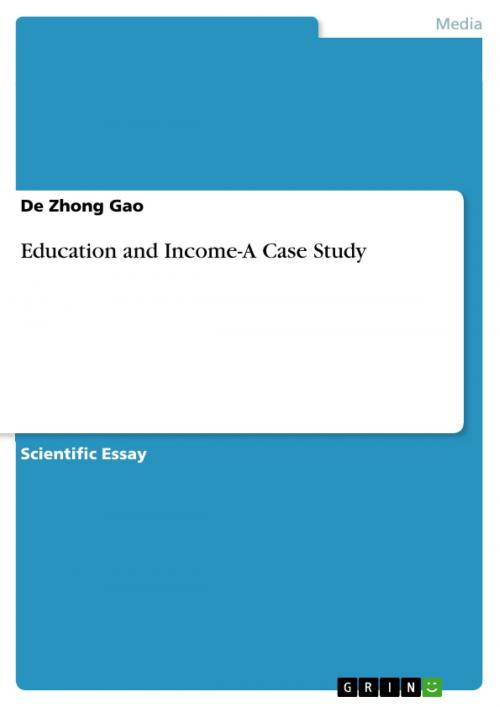| Author: | De Zhong Gao | ISBN: | 9783656122142 |
| Publisher: | GRIN Verlag | Publication: | February 7, 2012 |
| Imprint: | GRIN Verlag | Language: | English |
| Author: | De Zhong Gao |
| ISBN: | 9783656122142 |
| Publisher: | GRIN Verlag |
| Publication: | February 7, 2012 |
| Imprint: | GRIN Verlag |
| Language: | English |
Scientific Essay from the year 2011 in the subject Communications - Miscellaneous, grade: 70%, McGill University, course: Techniques of Empirical Research, language: English, abstract: There is a popular saying that all Yalies earn at least $110 after graduation. One can wonder whether a high level of education necessarily guarantees a high income in the future. In this paper, I will argue that the higher the level of education attained, the higher will be the earned income. In order to validate such causal relationship, I will bring three control variables in my testing hypothesis: the spurious variable of gender, the conditional variable of racial background, and socio-economic status-being in the middle or working class. As a spurious variable, gender affects people's level of education attained and income. Being a woman or man predetermines people's level of education and income in the future. Indeed, women have less access to education than their male counterparts, and thus they will earn a smaller income. A possible factor that can explain this is the dominance of paternalistic family in most Western societies that encourage men to pursue higher levels of education.
Scientific Essay from the year 2011 in the subject Communications - Miscellaneous, grade: 70%, McGill University, course: Techniques of Empirical Research, language: English, abstract: There is a popular saying that all Yalies earn at least $110 after graduation. One can wonder whether a high level of education necessarily guarantees a high income in the future. In this paper, I will argue that the higher the level of education attained, the higher will be the earned income. In order to validate such causal relationship, I will bring three control variables in my testing hypothesis: the spurious variable of gender, the conditional variable of racial background, and socio-economic status-being in the middle or working class. As a spurious variable, gender affects people's level of education attained and income. Being a woman or man predetermines people's level of education and income in the future. Indeed, women have less access to education than their male counterparts, and thus they will earn a smaller income. A possible factor that can explain this is the dominance of paternalistic family in most Western societies that encourage men to pursue higher levels of education.















